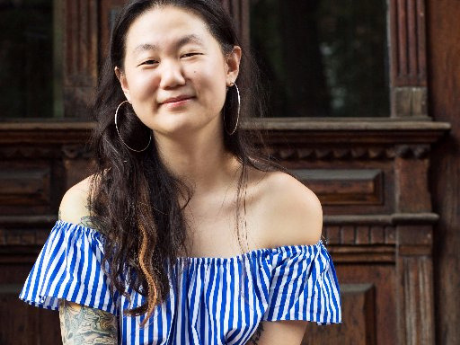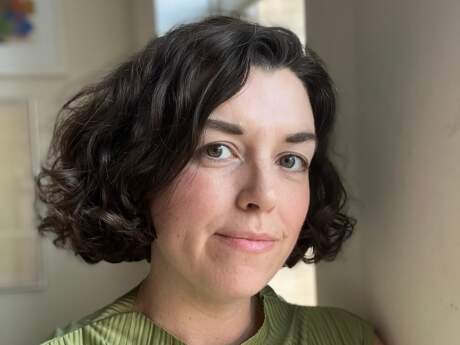In Their Own Words
Wendy Xu on “Several Altitudes of Not Talking”

Several Altitudes of Not Talking
You are part of other people but not
like them. You live in a little wooden box
and wake up with your face
in your palm and some sunlight.
Which is a sign of resignation but not
for you. Which is part of what I meant
by trying to affect change
in myself and also talking. By describing
to you that before a city can become
spectacular its buildings must put on
an iron gown. And then some workers
climb all around it. And it is like having
no teeth because you are waiting
for better teeth. I tell you I am very attached
to my old teeth. In a game called all of this
is hypothetical I did not once slide
my teeth across the table. I do not
even remember what you offered
as the hypothetical exchange for a life
where I only drink soup. There were
some girls on their bikes
and wind. There were some people
reuniting after many years apart or just
a day. You were not like everyone else
making demands with wild
gesticulations. I thought about maybe
trying to sharpen my knowledge
of jokes. I thought about really
needing a hug. A very important car
with sirens rumbled by and sounded
exactly right.
From You Are Not Dead (Cleveland State University Poetry Center, 2013). Reprinted with the permission of the author.
On "Several Altitudes of Not Talking"
This poem contains one of my favorite ways to think and talk about poetry: "a game called all of this is hypothetical."
It also happens to be the very first poem in my first book You Are Not Dead—first firsts seem particularly pleasurable. In the summer of 2011, when I wrote this poem, I had moved across the country to Western Massachusetts for poetry school. Living in the midst of relentless new was both overwhelming and productive—I'd never before so consciously watched other people, inhabiting all manner of physical space, for seemingly no reason at all. There was, frankly, not much else to do for many hours of the day besides to sit with my thoughts; certainly this was a luxury and a privilege. Some days my ability to pay attention to the perceived lives of others made me feel cripplingly alone, and on others, like I was genuinely participating in some kind of unspoken communion with strangers.
In most of my poems from that time, the phrase "other people" appears at least once. In this one, it is the feeling of being "part of other people but not / like them." I became increasingly sensitive to watching people "reunite," or at least what I would decide at the time was a reunion. Coffee shops are full of reunions taking place after an indeterminable period of time. I love to watch two people greet each other in public, perhaps having only seen each other the day before, but on their faces you could believe they'd been waiting to see one another again for so many long years. It is so lovely.
The game of hypotheticals in the poem is a real game I started playing with a friend at the time. We'd walk long afternoons around our neighborhood, offering each other increasingly absurd trades for "all of your teeth." Would you do it for that apartment? Would you do it for $2 million? Can you use the money to buy replacement teeth? It remains for me a particularly happy and vivid memory of passing the time by sharing in someone else's imagination. And of making poetry without being anywhere near a writing device—the hypothetical might be my favorite state of being. This poem is some attempt to express a feeling of being full of possibility. "I thought about really needing a hug" still makes me feel both sad and joyful—it's like, oh, I might get one. It is also the state of not being hugged. It is several altitudes of not talking about it, just imagining how wonderful it might be.


